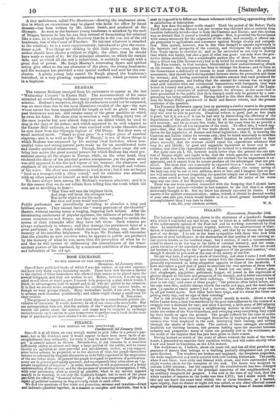BRAHAAL The veteran Brehm emerged from his retirement to appear
at the last "Wednesday Concert" in Exeter Hall. The announcement of his name attracted an overflowing audience; many persons were unable to obtain ad- mission. Braham's reception, though its enthusiasm could not he surpassed, was no more than due to the most illustrious vocalist of the age—the man whose career has been unparalleled for length as well as glory, and who, past threescore and ten, still retains many of the great qualities to which he owes his fame. He chose (not to mention a very trifling duet) two of the once popular but now almost forgotten sea ditties which he used to sing in the days of his prime; and which appeared to be well adapted to the Exeter Hall audience, as they were received with louder thunders than he ever drew from the Olympic regions of Old Drury. But they were of !mall musical merit. "Stand to your guns" is a vulgar piece of nautical claptrap; and it, as well as the "Bay of Biscay," is one of those things in which Braham was surpassed by his ancient rival Incledon, whose une- qualled voice and strong natural parts made up for an uncultivated taste and slender artistical attainments. Though, however, these songs did not bring into action the great mental powers for which Braham has stood pre- eminent among all the singers in Europe, while, on the other hand, they rendered the decay of his physical powers conspicuous, yet the great artist was still apparent in the fire and vigour of his manner, the clearness and emphasis of his elocution, and even, occasionally, the strength and volume of his voice. His shout was sometimes as loud as ever; but it was no longer "loud esti trumpet with a silver sound," and its emission was attended with an effort painful to himself as well as his hearers.
We have always been among Mr. Braham's warmest admirers; and it is for this reason that we do not refrain from telling him the truth which old men are so unwilling to hear- " That Time will rust the brightest blade, And years will break the strongest bow; Was never wight so starkly made But time and years would overthrow."
Public performers are proverbially unwilling to abandon a long and brilliant career. They cannot leave the " warm precincts of the cheerful" theatre, without casting many a longing, lingering look behind. After the Intoxicating excitement of popular applause, the stillness of private life be- comes monotonous and dreary, and they are often tempted to revisit the scenes of their triumphs after they have left them. Such returns are
always melancholy to witness; and they damage the permanent fame of a great performer, as the clouds which surround the setting sun efface the memory of his meridian brightness. We hope Mr. Braham will remember that the plaudits he now receives when he appears in public are produced by the memory of what he was, more than the perception of what he is; and that he will beware of obliterating the remembrance of the trans- cendent powers of his manhood, by a continued exhibition of the weakness and infirmities of his old age.






























 Previous page
Previous page